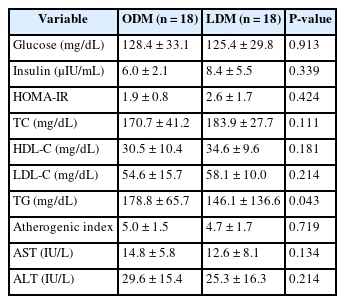Search
- Page Path
- HOME > Search
Research Article
- [English]
- Comparison of clinical characteristics and dietary intakes according to phenotypes of type 2 diabetes mellitus in South Korea: a cross-sectional study
- Mi-Jin Kim, Ji-Sook Park, Sung-Rae Cho, Daeung Yu, Jung-Eun Yim
- Korean J Community Nutr 2025;30(2):127-139. Published online April 29, 2025
- DOI: https://doi.org/10.5720/kjcn.2025.00059

-
 Abstract
Abstract
 PDF
PDF PubReader
PubReader ePub
ePub - Objectives
Clinical nutrition treatment is the central part of diabetes management, such as prevention, treatment, and self-management of diabetes, and personalized clinical nutrition treatment, which enables improvement in patients with type 2 diabetes mellitus (T2DM). Our study aimed to contribute to the improvement of appropriate nutrition management in personalized treatment for obese and non-obese diabetes patients.
Methods
T2DM patients were recruited as participants, and 36 final participants were assigned to the lean diabetes mellitus group (LDM; body mass index [BMI] < 25 kg/m2) and the obese diabetes mellitus group (ODM; BMI ≥ 25 kg/m2). We assessed the dietary intakes, body composition, dietary habits, the Korean version of obesity-related quality of life, and biochemical indices.
Results
According to the phenotype’s comparison, the ODM group had a high prevalence of T2DM complications and hypertension, had a dietary habit of less than 10 minutes of mealtime duration and preferred fast food intake, and had a low obesity-related quality of life. However, the LDM group had a high choice of Korean dishes at the time of eating out and a high intake of vitamin C, and iodine because of the intake of vegetables and seaweeds.
Conclusion
We observed differences in diet, nutrient intake, and clinical characteristics according to the phenotype of T2DM patients. In particular, obese diabetes patients have an increased risk of cardiovascular diseases, bad dietary habits, and low obesity-related quality of life. Therefore, personalized nutrition treatment is needed in consideration of the risk of cardiovascular disease and dietary habits for patients in the ODM group, as well as determining the energy requirements of Korean patients with T2DM.
- 864 View
- 28 Download


 KSCN
KSCN
 First
First Prev
Prev



